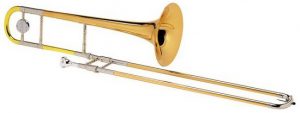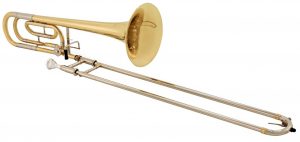Buying Your First Trombone
Showing all 4 resultsSorted by price: low to high
Buying your First Trombone
This little guide to buying your first trombone will help you get started as you begin your journey. There is much, much more to consider that what is written here – please contact us for expanded advice!
Below this guide is a list of new and (sometimes) second-hand small brass instruments – perfect for the beginner.
Tenor? Bass? Triggers?
Read: our in-depth guide to the brass instrument family
One of the most important aspects of the trombone is the bore size. As a player advances, they will usually start playing instruments with larger bores.

As a beginner, you will probably start on a small bore straight tenor trombone. This trombone is in the key of B♭ and does not contain any extra tubes, triggers, or attachments. A small bore straight tenor is not usually enough for an orchestral player, but it certainly has a place in the jazz world.

A common step-up instrument for intermediate players will be a medium bore trombone with a finger-operated trigger valve. It plays the same as the straight tenor trombone, but pulling the trigger sends the air through an extra length of tubing and changes the key to F. The larger bore means the player must push more air through, but the resulting tone is richer.
It is unlikely you will start your trombone journey on a bass trombone. The large bore makes it difficult for an inexperienced player.
New, Second-hand, or Rental?
There are two main concerns when it comes to the condition of a small brass instrument:
- Issues with the build quality at the manufacturing level
- Issues with how the instrument has been treated over the years
New Horns
Unlike woodwinds, most brass instruments are in fairly good playing condition when they first arrive from the factory. Most well-known manufacturers are consistently good, e.g. Bach, Yamaha, and Carolbrass.
In saying that, buying from a repair workshop like Vanguard is a smart idea! A workshop is able to check over a new instrument; it will ensure the crucial slide is operating like butter.
Important: if you want to enjoy playing the trombone, do not buy a cheap new one. Often TradeMe will have new instruments with brand names like ‘Constantine’ or something. Make no mistake: a Constantine trombone will undoubtedly be terrible. It will discourage anybody who attempts to play it.
Second-Hand Horns
Tread carefully in the minefield that is the second-hand brass instrument market. As well as the potential issues remaining from the manufacturer, an old horn might have been neglected. 50-year-old bacteria might have thrived in a dank closet and developed into a small, impressive ecosystem within the slide.
If your budget only allows for a second-hand instrument, please consider the following:
- Buy a brand that you have heard of
‘Yamaha’ or ‘Bach’ are brands you have heard of. ‘Mirage’ or other names related to visual trickery are not brands you have heard of. Google if unsure.
- Check the horn first
Bring your potential trombone into a workshop (e.g. Vanguard Orchestral) to get it checked if possible. It is not fun buying a $200 Conn from somebody’s grandad and then learning that it needs $500 worth of work to play.
- Buy from a workshop
Some workshops (including us) sell instruments on behalf for people. These will generally be in good playing condition or will have the repair cost built into the price.
Renting
Renting is a great, affordable way to start playing the trombone. It can let a new player know if they want to pursue something without committing to buying.
Rental instruments have usually been around the block a few times and may not be in the greatest condition. Your rental shop should keep their instruments serviced to a reasonable standard. If in doubt, bring the instrument into a workshop to get it checked over.
A bad horn can discourage a player. A good one can give a player years of joy!




